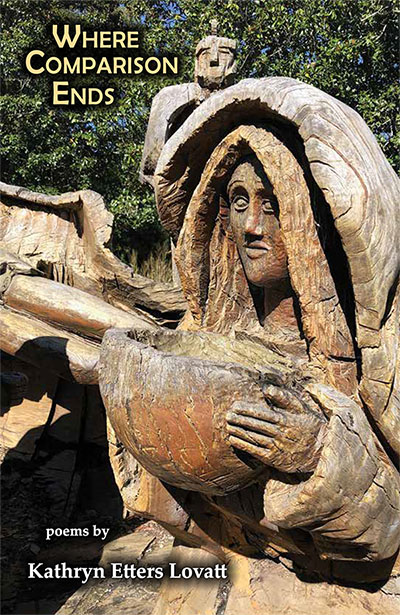Where Comparison Ends
poems by
Kathryn Etters Lovatt
ISBN: 978-1-59948-869-1, 38 pages, $12 (+ shipping)
Release Date: March 11, 2021
The Advance Sale Discount price expired February 17. For those who prefer to not buy online, the check price is now $16/book (which includes shipping) and should be sent to: Main Street Rag, PO BOX 690100, Charlotte, NC 28227-7001.
 Kathryn Etters Lovatt earned her M.A. in Creative Writing and English from Hollins University and continued graduate work while teaching at Hong Kong University. A Virginia Center of the Arts fellow and a recipient of South Carolina’s Carrie McCray Memorial Literary Award, she also received an individual artist grant from SC Arts Commission. Both her poetry and her prose have been nominated for The Pushcart Prize. She lives in Camden, SC, where she writes and naps in a cottage that was once a summer kitchen.
Kathryn Etters Lovatt earned her M.A. in Creative Writing and English from Hollins University and continued graduate work while teaching at Hong Kong University. A Virginia Center of the Arts fellow and a recipient of South Carolina’s Carrie McCray Memorial Literary Award, she also received an individual artist grant from SC Arts Commission. Both her poetry and her prose have been nominated for The Pushcart Prize. She lives in Camden, SC, where she writes and naps in a cottage that was once a summer kitchen.
Honorable Mention in the 2021 Tom Howard competition sponsored by Winning Writers.
Won the 2021 Coker Fellowship in Fiction, supported by the Coker Family Foundation and co-sponsored by the South Carolina Academy of Authors and the South Carolina Writers Association.
Through these poems we enter the sliver-thin gap of liminal space – a place where Nothing has begun yet, and nothing is over. Kathryn Etters Lovatt fills that gap and anchors the reader with an intimate look at those experiences that leave us teetering in-between – memories and regrets, hope and fear, aging and death. She reminds us we all inhabit liminal space, and a Promise that nothing is ever wasted, nothing is ever lost. ~Kim Blum-Hyclak
The poems of Kathryn Etters Lovatt’s marvelous Where Comparison Ends are suffused with virtues I love—wisdom, lyricism, elegiac honesty, and the clean grace of what I call line-confidence, the sense that each word, phrase, and line has been ratcheted into place. It is this last feature, most of all, which lights every poem with a burnished gleam. Where comparison ends, mature meaning is found. These poems enact what they implore their readers to do: commemorate as you remember and honor with gratitude your goodbyes. ~Mike Smith, author of the memoir And There was Evening and There Was Morning and the poetry collections Multiverse and Pocket Guide to Another Earth
Called Forth
Under this sun, the ghost of my grandmother appears;
my mother follows, a shimmer in her wake.
The two stand ankle-deep in nettles and wicker baskets.
Their teeth are rows of clothespins.
They move down the line in unison,
pitching tails of bleached sheets skyward.
A snatch of wrists seeds the day with billows
of telling dreams and white percale.
Unborn beneath a skein of bees and mimosa,
I wait for the clear blue of August to pass,
wait for the wind-bearing lungs of deep autumn,
the harvest of amber honey and myself.
My mothers will fetch me once they’re done.
They will finish here and come lift
the thought of me into the folds of their aprons,
pick sleep from our eyes and take me home.
Even now, their pocket charms sing in my ear:
river rock, pulley-bone, blade and spoon.
Nothing has begun yet, and nothing is over.
Visiting Hours
You talk of okra, the way your own mother
sizzled those seedpods in a cast iron skillet
on a cast iron stove.
What you wouldn’t give for a pan-full
and a cathead biscuit patted
in the rough cradle of her hands.
You rake the ground of your memory,
one after the other slips from your eyes
to the sere of your lips.
Quite a time you say you’ve had,
your only regrets a pillowtop mattress,
cheap dentures, not screening-in the porch.
Tomorrow, if you wake, you face
a hospital tray of egg substitute,
grits without butter or salt,
a fist of pills that cannot heal
your ills. You will ask again
I not pray for you to live. But now,
in our recollected kitchen, we imagine
the red Formica table where I learned
letters, numbers, butchered my hair.
In the double window over the sink,
daylight’s last shoot climbs each pane
like a gilded tendril, wild and beautiful.
What I Wish I Could Tell You
I wish I could tell you how hot
this summer has been, how
we sit on the porch waiting for a breeze.
None cuts through the honeysuckle vine.
Its insufferable sweetness gathers and hangs,
a fierce cloud without rain.
The garden peaked late this year,
now it goes too fast. Tomatoes took their time
coming in, then ripened all at once.
First of the season, I snatched them off the vine.
Unwashed, unsalted, their seeds
dripped off my chin onto the ground.
I’ve had my fill, but still, I take
a slice as they round the table. Between
the last good Heirloom of this year
and the first good one of next lies
a whopping wait. You, who could not wait,
should remember that. Although
if grace conveys to afterlife,
you know nothing of last spring, the way
your stomach boiled, how your tongue
turned bitter. We brought soft eggs, potassium broth,
a hush-hush elixir of garlic and peach pits.
You shook beneath the blankets
dreaming aloud of one decent tomato,
bright as a vial of blood, skin thin as your own,
stretched so tight it would shed in one long strip,
peel away like a blister. You ached
for the blinding blue skies out of your reach,
for the mouthwatering things such days produce.
You longed for times like these, afternoon
inching toward night as we name birds on a branch,
gauge pitches of thunder. Without you,
the dimming sky looks pitifully bald.
No shooting stars or rings around the moon,
no signs we know how to follow.
If you are able, find a way to remind us
all living things blossom and wither,
all things die and return.
Tell us again of nature’s order and economy.
Promise nothing is ever wasted,
nothing ever lost.


 Kathryn Etters Lovatt earned her M.A. in Creative Writing and English from Hollins University and continued graduate work while teaching at Hong Kong University. A Virginia Center of the Arts fellow and a recipient of South Carolina’s Carrie McCray Memorial Literary Award, she also received an individual artist grant from SC Arts Commission. Both her poetry and her prose have been nominated for The Pushcart Prize. She lives in Camden, SC, where she writes and naps in a cottage that was once a summer kitchen.
Kathryn Etters Lovatt earned her M.A. in Creative Writing and English from Hollins University and continued graduate work while teaching at Hong Kong University. A Virginia Center of the Arts fellow and a recipient of South Carolina’s Carrie McCray Memorial Literary Award, she also received an individual artist grant from SC Arts Commission. Both her poetry and her prose have been nominated for The Pushcart Prize. She lives in Camden, SC, where she writes and naps in a cottage that was once a summer kitchen.